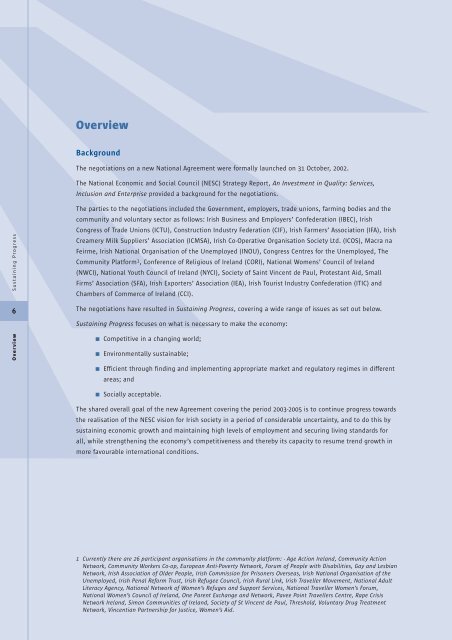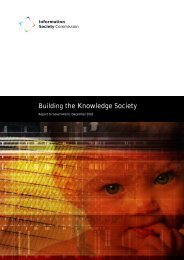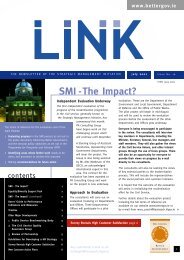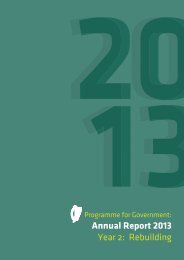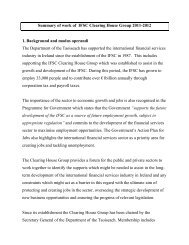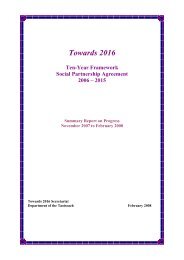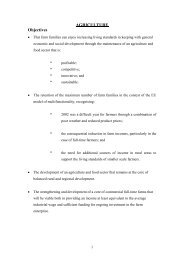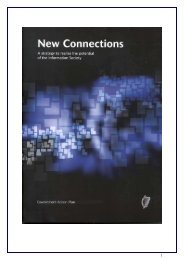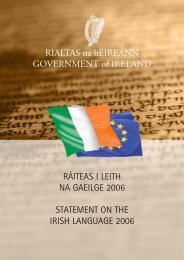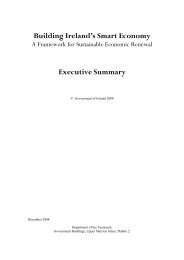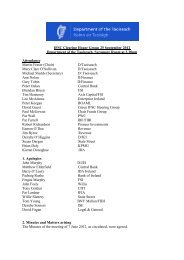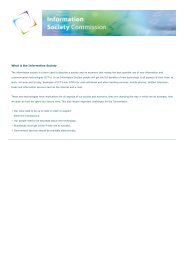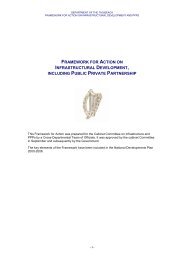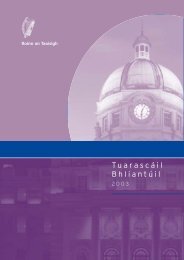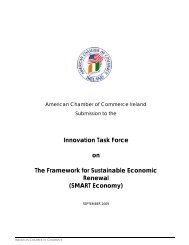Sustaining Progress - Department of Taoiseach
Sustaining Progress - Department of Taoiseach
Sustaining Progress - Department of Taoiseach
Create successful ePaper yourself
Turn your PDF publications into a flip-book with our unique Google optimized e-Paper software.
Overview <strong>Sustaining</strong> <strong>Progress</strong><br />
6<br />
Overview<br />
Background<br />
The negotiations on a new National Agreement were formally launched on 31 October, 2002.<br />
The National Economic and Social Council (NESC) Strategy Report, An Investment in Quality: Services,<br />
Inclusion and Enterprise provided a background for the negotiations.<br />
The parties to the negotiations included the Government, employers, trade unions, farming bodies and the<br />
community and voluntary sector as follows: Irish Business and Employers’ Confederation (IBEC), Irish<br />
Congress <strong>of</strong> Trade Unions (ICTU), Construction Industry Federation (CIF), Irish Farmers’ Association (IFA), Irish<br />
Creamery Milk Suppliers’ Association (ICMSA), Irish Co-Operative Organisation Society Ltd. (ICOS), Macra na<br />
Feirme, Irish National Organisation <strong>of</strong> the Unemployed (INOU), Congress Centres for the Unemployed, The<br />
Community Platform1 , Conference <strong>of</strong> Religious <strong>of</strong> Ireland (CORI), National Womens’ Council <strong>of</strong> Ireland<br />
(NWCI), National Youth Council <strong>of</strong> Ireland (NYCI), Society <strong>of</strong> Saint Vincent de Paul, Protestant Aid, Small<br />
Firms’ Association (SFA), Irish Exporters’ Association (IEA), Irish Tourist Industry Confederation (ITIC) and<br />
Chambers <strong>of</strong> Commerce <strong>of</strong> Ireland (CCI).<br />
The negotiations have resulted in <strong>Sustaining</strong> <strong>Progress</strong>, covering a wide range <strong>of</strong> issues as set out below.<br />
<strong>Sustaining</strong> <strong>Progress</strong> focuses on what is necessary to make the economy:<br />
■ Competitive in a changing world;<br />
■ Environmentally sustainable;<br />
■ Efficient through finding and implementing appropriate market and regulatory regimes in different<br />
areas; and<br />
■ Socially acceptable.<br />
The shared overall goal <strong>of</strong> the new Agreement covering the period 2003-2005 is to continue progress towards<br />
the realisation <strong>of</strong> the NESC vision for Irish society in a period <strong>of</strong> considerable uncertainty, and to do this by<br />
sustaining economic growth and maintaining high levels <strong>of</strong> employment and securing living standards for<br />
all, while strengthening the economy’s competitiveness and thereby its capacity to resume trend growth in<br />
more favourable international conditions.<br />
1 Currently there are 26 participant organisations in the community platform: - Age Action Ireland, Community Action<br />
Network, Community Workers Co-op, European Anti-Poverty Network, Forum <strong>of</strong> People with Disabilities, Gay and Lesbian<br />
Network, Irish Association <strong>of</strong> Older People, Irish Commission for Prisoners Overseas, Irish National Organisation <strong>of</strong> the<br />
Unemployed, Irish Penal Reform Trust, Irish Refugee Council, Irish Rural Link, Irish Traveller Movement, National Adult<br />
Literacy Agency, National Network <strong>of</strong> Women’s Refuges and Support Services, National Traveller Women’s Forum,<br />
National Women’s Council <strong>of</strong> Ireland, One Parent Exchange and Network, Pavee Point Travellers Centre, Rape Crisis<br />
Network Ireland, Simon Communities <strong>of</strong> Ireland, Society <strong>of</strong> St Vincent de Paul, Threshold, Voluntary Drug Treatment<br />
Network, Vincentian Partnership for Justice, Women’s Aid.


